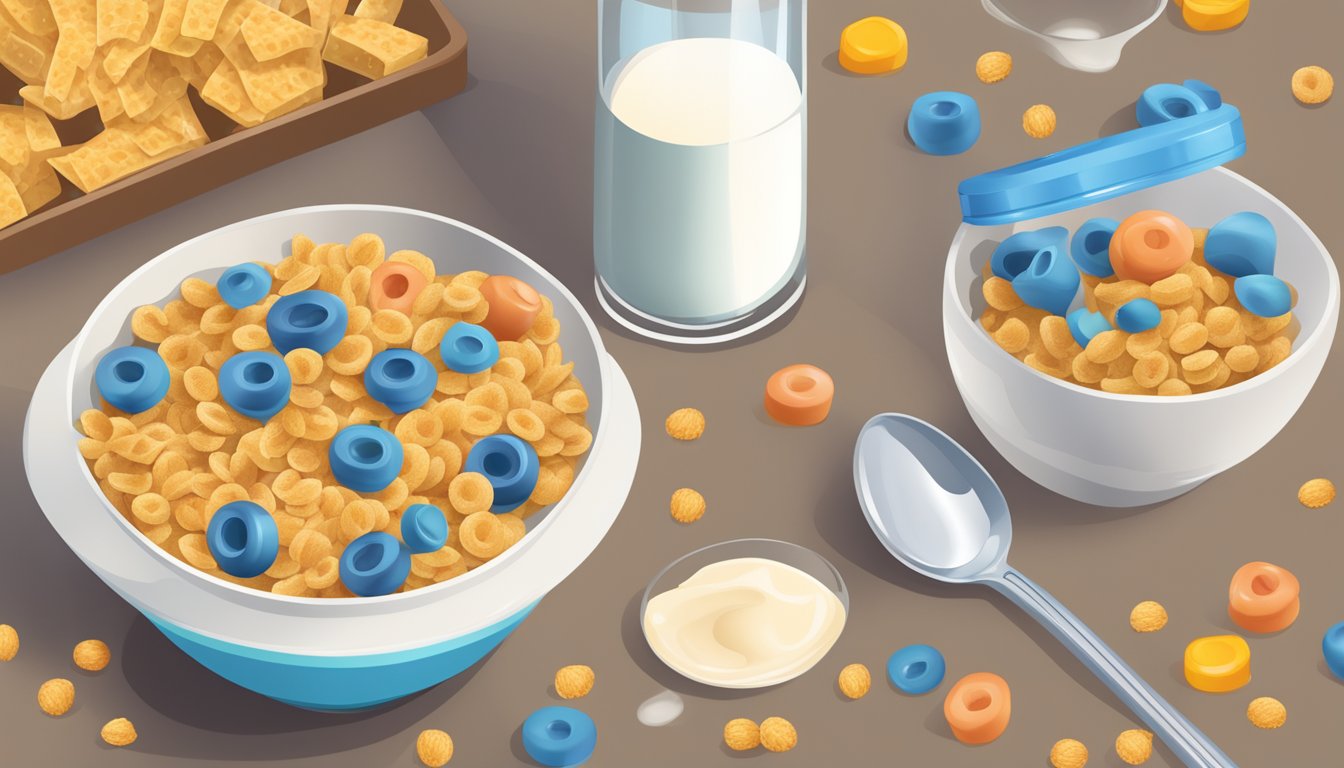Breakfast cereals fortified with vitamin B12 offer a convenient way to boost intake of this essential nutrient. Many popular brands now add B12 to their products, making it easier for people to meet their daily requirements. Cereals like Multi-Grain Cheerios, Whole Grain Total, and some varieties of Special K contain significant amounts of added vitamin B12, often providing over 25% of the recommended daily value per serving.
For those following plant-based diets or with absorption issues, fortified cereals can be particularly beneficial. Vitamin B12 plays a crucial role in red blood cell formation, neurological function, and DNA synthesis. Starting the day with a B12-fortified cereal may help maintain energy levels and support overall health.
When shopping for B12-fortified cereals, it’s important to check nutrition labels. The amount of added B12 can vary widely between products. Some cereals may contain as little as 1.5 micrograms per serving, while others provide over 6 micrograms. Choosing cereals with higher B12 content can help ensure adequate intake of this important nutrient.
Understanding Vitamin B12

Vitamin B12 is an essential nutrient crucial for various bodily functions. It plays a vital role in the formation of red blood cells, DNA synthesis, and nerve function.
This water-soluble vitamin is naturally found in animal products such as meat, fish, eggs, and dairy. Plant-based sources typically do not contain vitamin B12, making fortified foods important for vegetarians and vegans.
The recommended daily intake (RDI) of vitamin B12 for adults is 2.4 micrograms. Pregnant and breastfeeding women may require higher amounts.
Vitamin B12 deficiency can lead to:
- Fatigue
- Weakness
- Anemia
- Cognitive decline
- Nerve damage
Adequate B12 intake supports:
- Energy metabolism
- Brain health
- Nervous system function
- Red blood cell production
Many breakfast cereals are fortified with vitamin B12, providing an easy way to boost intake. The amount added varies by product, typically ranging from 1.5 to 6.5 micrograms per serving.
Regular consumption of B12-fortified cereals can help maintain healthy levels of this vital nutrient, especially for those following plant-based diets or at risk of deficiency.
Breakfast Cereals and Nutrition
Breakfast cereals provide a convenient source of energy and nutrients to start the day. Many cereals are fortified with vitamins and minerals to enhance their nutritional profile.
Fortified Breakfast Cereals
Cereal manufacturers often add vitamins and minerals to their products during processing. This fortification aims to boost the nutritional value of cereals. Common fortified nutrients include B vitamins, iron, zinc, and vitamin D.
Vitamin B12 is a key nutrient added to many breakfast cereals. For example, General Mills Multi-Grain Cheerios contain 5.67 mcg of B12 per serving. Post Cocoa Pebbles provide 1.5 mcg of B12 per serving.
Some store-brand cereals also offer B12 fortification. Tesco’s Low Fat Special Flakes contain 2.50 µg of vitamin B12 per 100g.
Health Benefits of Fortified Cereals
Fortified cereals can help consumers meet their daily nutrient requirements. This is particularly beneficial for individuals with restricted diets or limited access to nutrient-dense foods.
B12 fortification is especially important for vegetarians and vegans. Since B12 is naturally found in animal products, fortified cereals provide a plant-based alternative.
Regular consumption of fortified cereals may help prevent nutrient deficiencies. This can support overall health, including proper nervous system function and red blood cell formation.
Comparing Nutrient Content in Cereals
Nutrient content varies widely among breakfast cereals. Some offer high levels of added vitamins and minerals, while others focus on fiber or protein content.
Here’s a comparison of B12 content in popular cereals:
| Cereal | B12 Content |
|---|---|
| General Mills Whole Grain Total | 6.42 mcg |
| Multi-Grain Cheerios | 5.67 mcg |
| Post Cocoa Pebbles | 1.5 mcg |
When selecting cereals, it’s important to consider the overall nutritional profile. Look for options with balanced nutrient content, including fiber, protein, and essential vitamins and minerals.
Check nutrition labels to compare cereals. Pay attention to serving sizes, as they can vary between products. This ensures accurate comparison of nutrient content across different cereal brands.
Fortification of Cereals with Vitamin B12

Breakfast cereals are commonly fortified with vitamin B12 to boost their nutritional value. This process enhances the availability of this essential nutrient, especially for those following plant-based diets.
Production Process
Vitamin B12 fortification involves adding synthetic B12 to cereal products during manufacturing. Manufacturers typically spray a B12 solution onto the cereal pieces before packaging. The amount added varies by brand and product.
Some companies use a dry mix method, blending B12 powder with other ingredients. Quality control measures ensure uniform distribution throughout the cereal batch.
The fortification process must account for potential B12 loss during storage and cooking. Manufacturers often add slightly more than the labeled amount to compensate for these losses.
Types of Cereals Fortified with Vitamin B12
Many popular breakfast cereals contain added vitamin B12. Whole grain cereals, bran flakes, and oat-based products are frequently fortified.
Some examples include:
- Multi-Grain Cheerios (5.67 mcg per serving)
- Whole Grain Total (6.42 mcg per serving)
- Cocoa Pebbles (1.5 mcg per serving)
Fortified cereals can provide a significant portion of the daily recommended B12 intake. The exact amount varies by brand and serving size.
Granola, muesli, and some organic cereals may also be fortified, though less commonly. Consumers should check nutrition labels for specific B12 content.
Recommended Brands and Products
Several major cereal brands offer products fortified with vitamin B12. These options range from mainstream favorites to health-focused alternatives and budget-friendly choices.
Mainstream Brands
General Mills leads the pack with its Total cereal, providing 100% of the daily value for vitamin B12 per serving. Cheerios, another General Mills staple, offers a B12-fortified option in its Multi-Grain variety. Kellogg’s contributes to the B12-fortified cereal market with Special K and Smart Start Strong Heart Antioxidants. These cereals not only provide essential B12 but also offer a familiar taste many consumers enjoy.
Post’s Cocoa Pebbles is a kid-friendly option that includes B12 fortification. For those seeking a balance of taste and nutrition, Honey Bunches of Oats provides B12 along with other essential vitamins and minerals.
Health-Conscious Options
Kashi Heart to Heart cereal caters to health-conscious consumers, offering B12 fortification alongside whole grains and heart-healthy ingredients. Kellogg’s All-Bran provides a high-fiber option with added B12, supporting digestive health and nutrient intake.
For those looking to maximize their vitamin intake, Kellogg’s Product 19 stands out. This cereal is heavily fortified with various vitamins and minerals, including a significant amount of B12.
Private Labels and Budget Options
Store brands and budget-friendly alternatives often match the nutritional profiles of their name-brand counterparts. Malt-O-Meal produces B12-fortified cereals at a lower price point, making vitamin supplementation more accessible.
Many grocery chains offer their own B12-fortified cereals under private labels. These products typically provide similar nutritional benefits to mainstream brands but at a reduced cost.
Bulk cereal options, such as store-brand bran flakes or corn flakes, often include B12 fortification. These choices allow consumers to enjoy the benefits of B12 supplementation without breaking the bank.
Alternative Sources of Vitamin B12

Vitamin B12 can be obtained from various food sources beyond fortified cereals. These include both animal-based products and plant-based or synthetic options for those following vegetarian or vegan diets.
Animal-Based Sources
Fish and seafood are excellent sources of vitamin B12. Clams, sardines, and trout contain high levels of this essential nutrient. Beef, particularly beef liver, is another rich source. Lamb and poultry also provide significant amounts of B12.
Dairy products like milk, cheese, and eggs are reliable sources for vegetarians. A single serving of milk or yogurt can provide a substantial portion of the daily recommended intake.
Shellfish, including mussels and oysters, are B12 powerhouses. Tuna and salmon are popular fish options that offer good amounts of the vitamin.
Plant-Based and Synthetic Options
For those following a plant-based diet, fortified nutritional yeast is an excellent B12 source. It can be sprinkled on various dishes to boost nutritional content.
Plant-based milk alternatives, such as soy or almond milk, are often fortified with B12. It’s important to check labels, as fortification levels can vary between brands.
Some breakfast cereals and plant-based meat substitutes are fortified with B12. These can be valuable options for vegans and vegetarians.
Supplements are available for those who struggle to meet their B12 needs through diet alone. These come in various forms, including pills, sublingual tablets, and injections.




